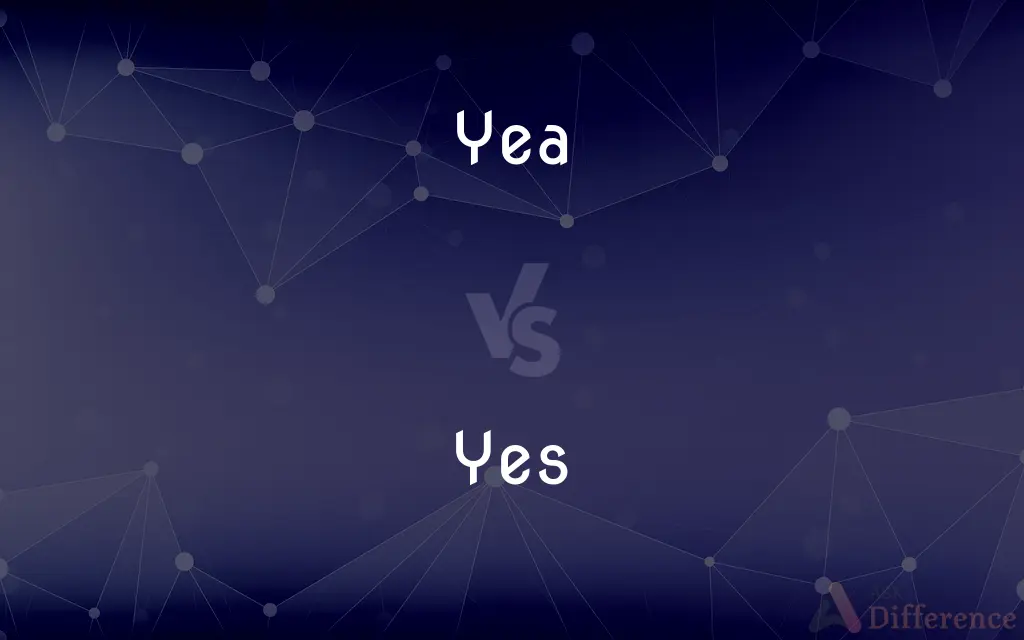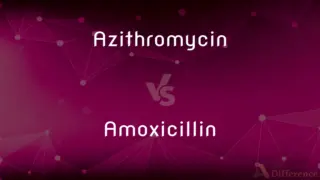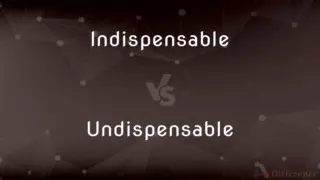Yea vs. Yes — What's the Difference?
Edited by Tayyaba Rehman — By Maham Liaqat — Updated on April 8, 2024
Yea is an old-fashioned or formal way of saying yes, often used in voting, while yes is a standard affirmative response in modern English.

Difference Between Yea and Yes
Table of Contents
ADVERTISEMENT
Key Differences
Yea is primarily used in formal contexts, such as legislative votes or archaic texts, serving as an affirmative vote or agreement. It has a formal tone and is less common in everyday conversation. Yea is often seen in settings where votes are being recorded or in literature to convey a sense of antiquity or solemnity. On the other hand, yes is the ubiquitous term for affirmation or agreement in contemporary English, used in both formal and informal settings. Yes is versatile, appearing in casual conversations, formal agreements, and everywhere in between.
The pronunciation of yea (often sounding like "yay") can distinguish it from yes in spoken language, adding a level of formality or emphasizing the affirmation in specific contexts. Yes, however, is universally recognized and used without such connotations of formality or historical context. Its pronunciation is straightforward and widely understood, making it a fundamental part of English communication.
In terms of usage, yea is most commonly found in contexts where tradition or formality is emphasized, such as parliamentary procedures, formal polls, or historical narratives. Yes, however, is adaptable and fits seamlessly into any conversation or agreement, serving as the standard expression of consent, approval, or affirmation without the formal undertones of yea.
While yea has a specific niche, especially in legal, legislative, and historical documents or settings, yes is an all-encompassing term that conveys agreement or affirmation in any context. The distinction between the two highlights the evolution of language and the adaptation of words to fit the communicative needs of society over time.
Understanding the difference between yea and yes is important for recognizing the context in which each is appropriate. Yea, with its formal and antiquated connotations, is reserved for specific settings, whereas yes is a universal affirmation used daily by English speakers worldwide.
ADVERTISEMENT
Comparison Chart
Usage Context
Formal votes, archaic texts.
Standard affirmative response in all contexts.
Tone
Formal, old-fashioned.
Neutral, versatile.
Pronunciation
Often sounds like "yay."
Pronounced as /jɛs/.
Commonality
Less common, used in specific formal or historical contexts.
Extremely common, used universally.
Connotations
Tradition, formality, solemnity.
Universality, adaptability, everyday communication.
Compare with Definitions
Yea
Associated with legislative or formal decisions.
The measure passed with 50 yeas.
Yes
Fundamental part of English agreement.
Yes, I understand your point.
Yea
Used in archaic or solemn contexts.
Yea, verily, the knight accepted the quest.
Yes
Expresses agreement or consent.
Yes, you may proceed with your plan.
Yea
Suggests formality or antiquity.
The council's decision was a unanimous yea.
Yes
Universal affirmative response.
Yes, I will attend the meeting.
Yea
Indicates affirmative in a formal register.
The assembly cried yea, endorsing the proposal.
Yes
Versatile in communication.
She said yes to the marriage proposal.
Yea
Formal affirmation, especially in voting.
The senator voted yea on the bill.
Yes
Used in both formal and informal settings.
Yes, that’s exactly what I meant.
Yea
Yes
She has the right to say yea or nay
Yes
Used to give an affirmative response
‘Do you understand?’ ‘Yes.’
Yea
Variant spelling of yay
Yes
Used as a response to someone addressing one or trying to attract one's attention
‘Oh, Mr Lawrence.’ ‘Yes?’
Yea
An affirmative answer
The British government would give the final yea or nay
Yes
Used to question a remark
‘It should be easy to check.’ ‘Oh yes? How?’
Yea
Yes; aye.
Yes
Encouraging someone to continue speaking
‘When you bought those photographs …’ ‘Yes?’
Yea
Indeed; truly
They have spoken, yea, shouted their reply.
Yes
Expressing great pleasure or excitement
Plenty to eat, including hot hamburger sandwiches (yes!)
Yea
Variant of yay2.
Yes
Expressing irritation or impatience
‘Is the pain still there?’ ‘Yes, yes, damn you, the pain is always there’
Yea
An affirmative statement or vote.
Yes
An affirmative answer or decision, especially in voting
Answering with assured and ardent yeses
Yea
One who votes affirmatively.
Yes
It is so; as you say or ask. Used to express affirmation, agreement, positive confirmation, or consent.
Yea
(dated) Yes, indeed.
Yes
An affirmative or consenting reply.
Yea
Thus, so (now often accompanied by a hand gesture by way of measurement).
The pony was yea high.
Yes
An affirmative vote or voter.
Yea
(archaic) Or even, or more like, nay. Introduces a stronger and more appropriate expression than the preceding one.
Yes
To give an affirmative reply to.
Yea
(in some dialects of American English, including Southern, Western, and African American Vernacular) Yeah, right, yes.
Yes
Used to express great satisfaction, approval, or happiness.
Yea
Misspelling of yay
Yes
(interrogative) Used to ask for more information with a request.
I need some help.
Yes?
Yes?
Yea
An affirmative vote, usually but not always spoken
Yes
An affirmative expression; an answer that shows agreement or acceptance.
Was that a yes?
Yea
Yes; ay; a word expressing assent, or an affirmative, or an affirmative answer to a question, now superseded by yes. See Yes.
Let your communication be yea, yea; nay, nay.
Yes
A vote of support or in favor/favour of something.
The workers voted on whether to strike, and there were thirty "yeses" and one "no".
Yea
An affirmative vote; one who votes in the affirmative; as, a vote by yeas and nays.
Yes
To agree with, affirm, approve.
Did he yes the veto?
Yea
An affirmative;
The yeas have it
Yes
(slang) to attempt to flatter someone by habitually agreeing
Yea
Not only so, but;
I therein do rejoice, yea, and will rejoice
Yes
Ay; yea; - a word which expresses affirmation or consent; - opposed to no.
Yes
An affirmative;
I was hoping for a yes
Common Curiosities
Is yea still used today?
Yes, but mainly in formal contexts like legislative procedures or historical reenactments.
What is the difference between yea and yes?
Yea is a formal or archaic affirmation, often used in voting, while yes is a standard affirmative response in all contexts.
Can yea and yes be used interchangeably?
Not in all contexts; yea is specific to formal or archaic settings, whereas yes is universally applicable.
Why is yea used in voting?
It’s a tradition in many formal voting settings, such as parliaments, to use yea for affirmative votes.
How does the pronunciation of yea differ from yes?
Yea is often pronounced like "yay," while yes is pronounced as /jɛs/.
Can using yea in everyday conversation confuse people?
It might, due to its formal and less common usage compared to the universally understood yes.
Has the use of yea declined over time?
Yes, as language has evolved, yea has become more specialized, while yes remains a staple of everyday language.
Why is yes more common than yea?
Yes is more versatile and neutral, fitting into any conversation or context without the formal or archaic connotations of yea.
Do any languages have similar distinctions as yea and yes?
Many languages have formal and informal variations for affirmations, though the specifics vary.
Can yes express enthusiasm in ways yea cannot?
Yes, through intonation and context, yes can convey a range of emotions, including enthusiasm, which yea typically does not.
What implications does using yea over yes have in communication?
Using yea might convey a more formal or traditional tone, suggesting a specific context or intention.
Is yea considered outdated?
In everyday conversation, yes, but it retains its place in formal votes and certain texts for its historical and traditional value.
How does context affect the choice between yea and yes?
The choice depends on the formality of the situation, with yea suited for formal decisions and yes for general affirmations.
Is yea ever used in modern writing?
Yes, but typically to convey a specific tone or setting, such as historical narratives or formal documents.
How has the usage of yea influenced modern language?
Yea has maintained its role in formal and legislative contexts, reminding us of the language’s historical layers and formal traditions.
Share Your Discovery

Previous Comparison
Azithromycin vs. Amoxicillin
Next Comparison
Indispensable vs. UndispensableAuthor Spotlight
Written by
Maham LiaqatEdited by
Tayyaba RehmanTayyaba Rehman is a distinguished writer, currently serving as a primary contributor to askdifference.com. As a researcher in semantics and etymology, Tayyaba's passion for the complexity of languages and their distinctions has found a perfect home on the platform. Tayyaba delves into the intricacies of language, distinguishing between commonly confused words and phrases, thereby providing clarity for readers worldwide.















































